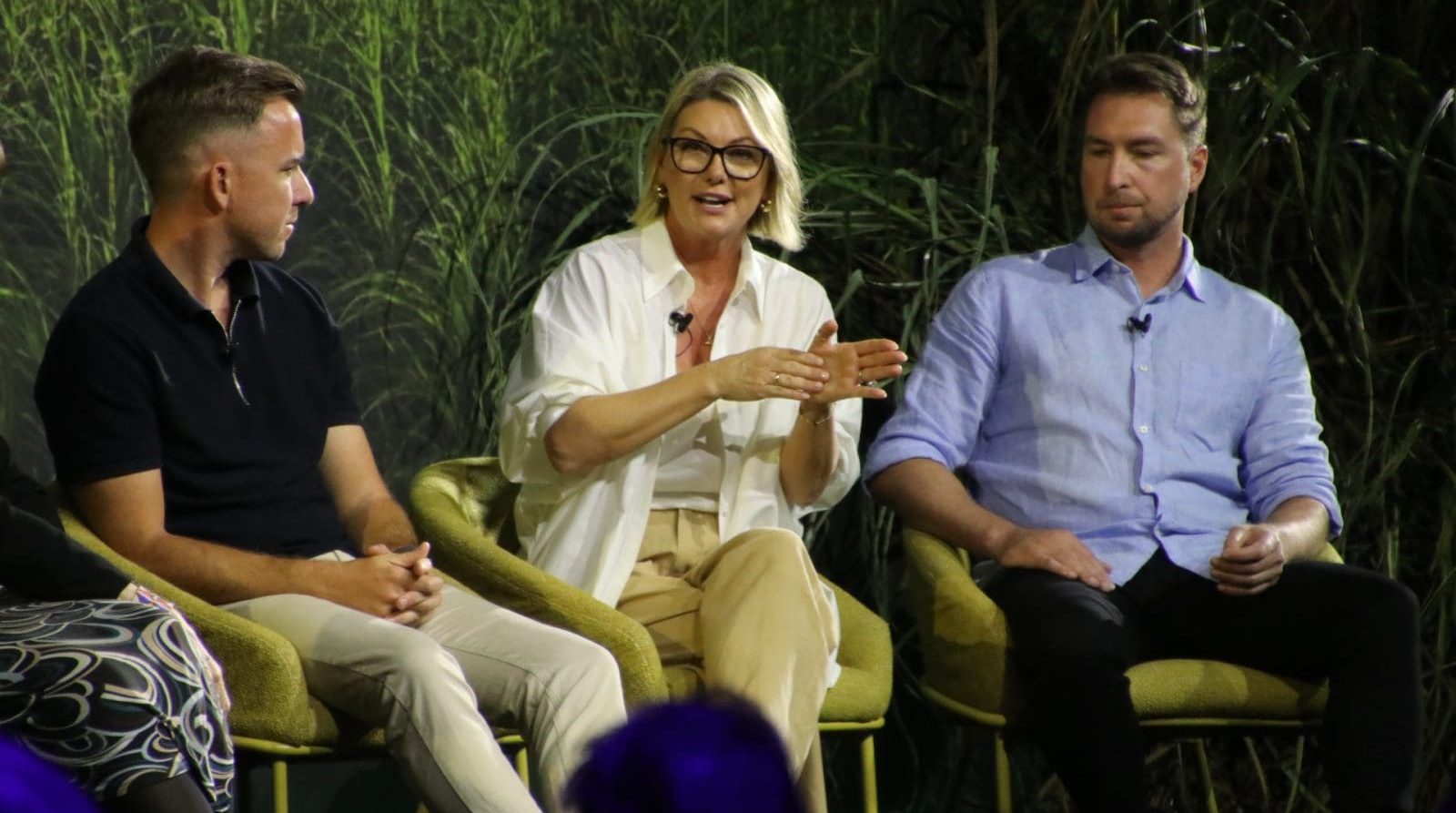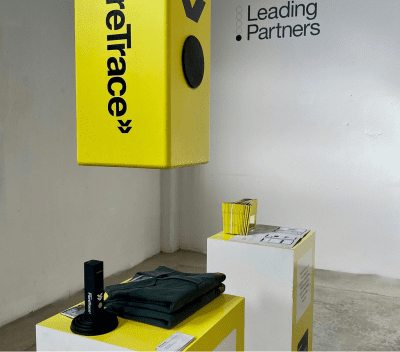
Coles general manager – meat, deli, seafood, Martin Smithson, Sundown Pastoral co-owner and FibreTrace founder Danielle Statham and Latitude 28 Produce and Orijin founder James Williamson on a panel at EvokeAg last week.
FRUSTRATION over cotton’s reputation in some circles as an environmentally damaging industry led grower and agtech founder Danielle Statham to prioritise farm transparency and traceability.
Sundown Pastoral co-owner, Mrs Statham believes capturing data along the supply chain and making it available to consumers gives industry the opportunity to create an accurate “narrative” about agriculture and the impact cropping has on the environment.
As part of a panel discussion at last week’s AgriFuture’s EvokeAg event in Brisbane, Mrs Statham said transparency was crucial to ensuring Australian cotton remained a fibre of choice for brands and consumers, especially in overseas markets.
“Transparency is a massive education piece for the consumer to actually be able to determine whether they are buying something that is actually better for the planet,” Mrs Statham said.
“When you have transparency…you are allowing yourself as a producer or as an industry body to control the narrative.
“Not necessarily is an organic fibre going to be better.
“The only way that we can determine it is by measuring how we how we grow that fibre.”
She said there was a “misconception out there in the world” that certain labels or claims were always better for the environment, but it was not always backed up by evidence.
“The more that we can be transparent about our fibre, about our data, our measurements, we can actually create a very strong narrative for what we are buying as consumers.”
FibreTrace technology
Mrs Statham and her husband David have a broad interest in the Australian cotton industry, from growing to ginning, partners with clothing brands and even fertiliser production via Good Earth Green Hydrogen and Ammonia project.
In addition to growing cotton at Sundown Pastoral Company properties and operating Wathagar Ginning near Moree through a joint venture, the Stathams have launched Good Earth Cotton, a regenerative farming program, and FibreTrace, a company focused on innovative cotton traceability technology.

A FibreTrace exhibit at a recent trade show.
Invented by British scientist Paul Stenning and bought by the Stathams, the technology embeds the fibre with a luminescent pigment which creates a unique, scannable identifier that remains with the material throughout processing.
This allows representatives and consumers to verify the origin and authenticity of the fibre throughout any stage of the supply chain.
It is applied at the ginning level and has already been implemented at Wathagar.
Brands such as Country Road, Target, and RM Williams already sell garments embedded with FibreTrace.
In June last year, Cargill announced it had partnered with FibreTrace with an aim to tag 50,000 tonnes of US and Brazil cotton.
Mrs Statham said the FibreTrace business was “something that was born from frustration, sheer frustration”.
“I was sick of hearing that cotton fibre was detrimental to the earth.”
She said proving the reality of Australian cotton farming through traceability technology was essential to building consumer trust and transparency.
“We can change that narrative through that great storytelling.
“Now we can actually provide numbers so we can… stand by our word with real fibre integrity and honesty in what we’re saying.”
Global regulations, marketing opportunities
Like most agricultural commodities, cotton fibre is significantly altered and processed as it moves through the gin, milling and garment-manufacturing supply chain.
Mrs Statham said the only way to have an accurate traceability system with a product like cotton was to embed it on each individual fibre.
“The cotton industry has so many hands that that fibre passes through.
“Once it gets to the spinning mill or the weaving [mill], there are so many different blends of fibres to actually come into that one mill.
“How do we actually know what is going into our garments at the end of the day?
“We don’t, unless we have a physical tracer connected into a blockchain or to a digital tracer.”
She said traceability technology could help Australian cotton expand its global presence by strengthening its reputation as a responsible and ethical fibre.
“I think for us that’s a really important aspect for the fibre industry moving forward and particularly Australian fibre moving forward, so we can differentiate ourselves in the market.
“We’re an export country; we don’t have any manufacturing here.
“We have to be radical in the way in which we approach our export market.
“We need to change the way in which we think as industry bodies; we need to embrace the new technologies, it’s what the new generation wants and what they expect.”
Alongside creating new marketing opportunities, transparency backed up by accurate product traceability is slowly becoming a mandatory requirement in some jurisdictions.
From 2027, the European Union is aiming to implement new regulations requiring nearly all products sold in the region to have a digital product passport.
This passport would provide members of the supply chain access to information about each product’s origin, materials, environmental impact and disposal recommendations.
Textiles are a key target industry for the regulation, alongside electronics, batteries, vehicles and plastics.
Mrs Statham was part of the EvokeAg session titled Radical transparency: Rewiring the agrifood supply chain which also featured Coles general manager – meat, deli, seafood Martin Smithson, Latitude 28 Produce and Orijin founder James Williamson, and DownForce Technologies founder and chief scientific officer Jacqueline McGlade.
Nearly 2000 delegates took part in AgriFuture Australia’s EvokeAg event held at Brisbane Convention and Exhibition Centre on Tuesday and Wednesday.
The two-day program and sideline events showcased insights from leading agrifood startups, producers, retailers, and investors.

HAVE YOUR SAY